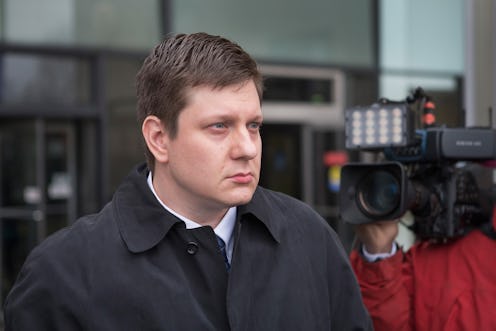News
WIll Office Jason Van Dyke Be Convicted?
On Tuesday morning, Chicago police officer Jason Van Dyke plead not guilty to first-degree murder charges stemming from his fatal shooting of black teenager Laquan McDonald in late 2014. Van Dyke isn't the first police officer to face a situation like this, and as anti-police-brutality activists know all too well, it's a tough road. So is it likely that Van Dyke will be convicted for killing McDonald?
The case continues to generate huge attention and outcry, whether on social media or in the streets of Chicago. Despite the initial claims in the police account of McDonald's death, video of the shooting showed clearly that McDonald was moving away from Van Dyke, not "lunging" toward him, when the officer opened fire. McDonald was struck with 16 bullets, all but a couple reportedly coming after he was already on the ground. Van Dyke claimed that McDonald pointed a knife at him.
Subsequent allegations that the CPD attempted to purge security camera footage of the shooting from a nearby Burger King also fueled accusations of a cover-up, and has intensified calls for Chicago mayor Rahm Emanuel to resign. Police Superintendent Garry McCarthy has called the allegations "absolutely not true."
In the courtroom, things could come down to how effectively the prosecution makes their case and how willing the jury is to consider the facts in the video of the shooting. However, when you look at some numbers, it's clear what a tall order that is. As FiveThirtyEight detailed last month after analyzing data from the National Police Misconduct Reporting Project (NPMRP) and the Bureau of Justice Statistics, when members of law enforcement are charged with criminal wrongdoing ― which is very rare in and of itself, with grand juries rarely electing to indict ― they tend to get a very favorable ride from juries. Compare the NPMRP's police conviction rates for 2010 with the general population's rates in 2006, and the reality is laid pretty bare. In the majority of cases (67 percent), the criminally-charged cops received no conviction, and the vast majority (88 percent) received no prison time.
There are a lot of possible explanations for this, the simplest being that police have for years been venerated as heroic authority figures in mainstream American opinion, and that as such, juries tend to give them the benefit of the doubt. It's also true that there are longstanding, robust legal precedents that allow police officers to use lethal force if they fear that their lives (or the lives of civilians) are in danger. Pair those realities with white America's forceful, centuries-long fear of black people, and you've got all the makings of a broken, unaccountable system.
Obviously, it remains to be seen whether these numbers will break in Van Dyke's favor. By most measures, his would rate as an exceptional case. Having dashcam footage that shows the entire shooting from start to finish is nothing if not a boon to the prosecution, especially as the video starkly contradicts what some police officials claimed in its immediate aftermath.
But in the current climate, there's simply no way to know for sure. After all, on Tuesday, a Cleveland grand jury declined to indict the police officer who fatally shot 12-year-old Tamir Rice, let alone find him guilty in a criminal trial, and video in that case showed him shooting the boy immediately upon his arrival on the scene.
